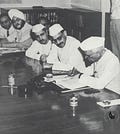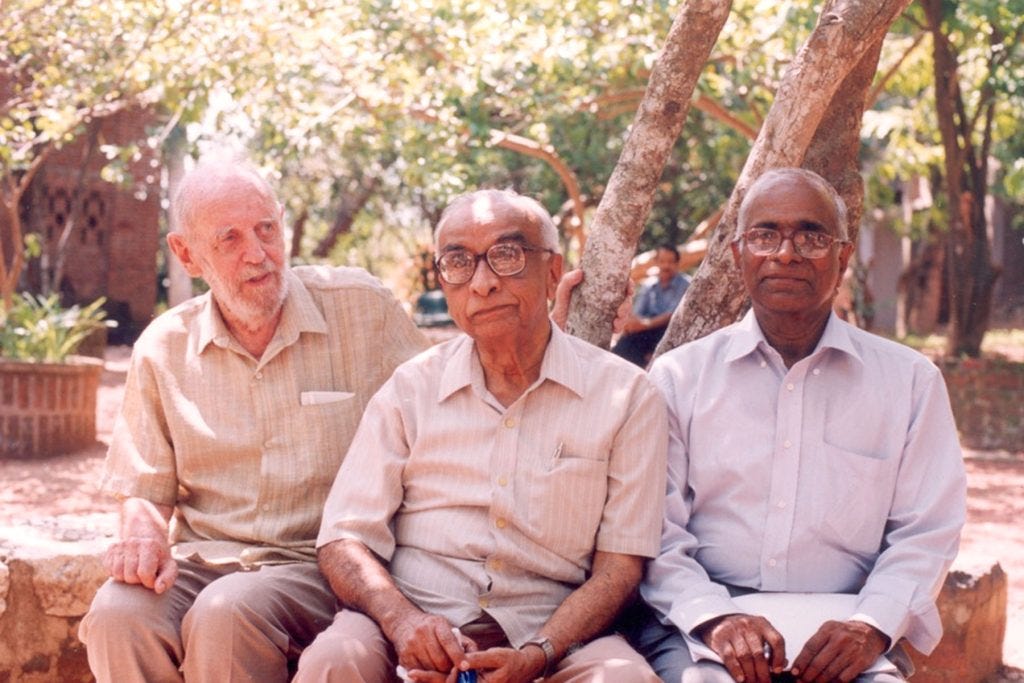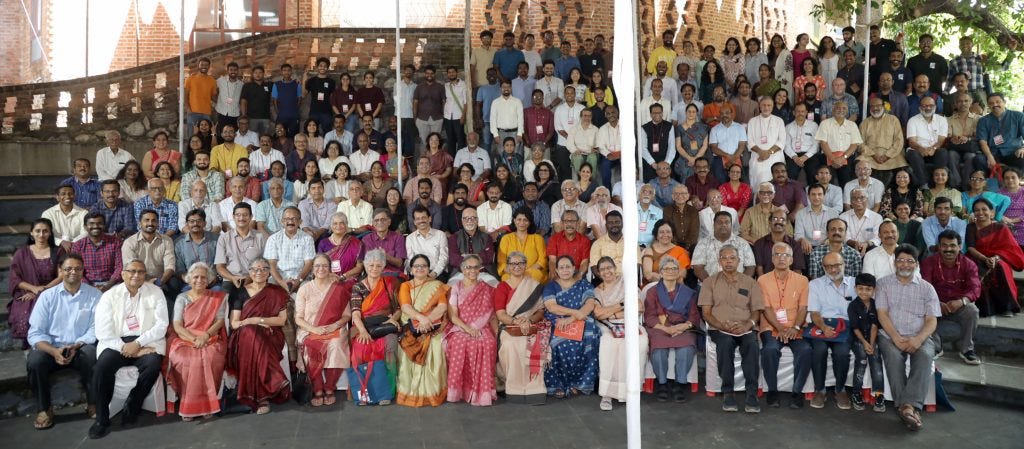K.N. Raj’s Legacy As Economist and Teacher
The economic insights of K.N. Raj remain relevant today, fifty three years after he founded the Centre For Development Studies, India
(Photo: K.N.Raj, extreme left, and other members of the Indian Planning Commission with Jawaharlal Nehru, India’s first Prime Minister, right. Courtesy: CDS.)
October 31, 2024
K.N. Raj “inspired me in two ways,” said Pranab Bardhan, a Professor Emeritus at the University of California, Berkeley. “I hardly knew anybody who had a larger vision of the structure of the Indian economy, combined with a grasp of the micro-realities of the various diversities in Indian economies. This combination is extremely rare.”
Bardhan was in conversation with Gita Sen at a conference marking the 100th birth anniversary of Raj, founder of the Centre for Development Studies (CDS), Trivandrum, India. The conference and a CDS alumni gathering were held at CDS from October 19 to 22.
Raj pointed out that technological changes can favor capitalists and increase economic and political inequality, potentially exacerbating rural-urban disparities and creating a new form of colonialism, said Gita Sen.
Sudipto Mundle, chair of CDS’s board, noted Raj’s legacy as an institutional builder, particularly his focus on grassroots development. “Under professor Raj’s leadership, CDS did pioneering research on the development experience of Kerala, a study now famous as the CDS UN study of 1975,” Pinarayi Vijayan, Chief Minister of Kerala, said while inaugurating the conference.
T. M. Thomas Isaac described CDS as the "academic fountainhead" for numerous policy reforms in Kerala, bridging academic research and real-world applications. Raj also contributed “to development policy worldwide,” said C. Veeramani, director of CDS, while welcoming alumni, students and guests to the celebrations.
Under Raj, CDS became “a world-renowned economic research institute”, in part due to his connections with leading economists, including Joan Robinson and Nicholas Kaldor, a Nobel prize winner, as well as with officials of various United Nations agencies, noted Beena P.L, convener of the Raj centennial conference.
K. M. Chandrasekhar spoke about Raj’s intellectual rigor, where thorough analysis preceded written work and economic theories sought to solve practical problems. Raj wanted researchers to "first study empirically the complex structures and inter-relationships characteristic of traditional agrarian economies before attempting to advance general theories," said Suraj Jacob.
M.A. Oommen noted that Raj linked academic research with real-world needs, especially in his seminal work, "Poverty, Unemployment and Development Policy." K. L. Krishna spoke of Raj's contributions to strengthening the curriculum and PhD program at the Delhi School of Economics.
(Photo: K.N.Raj center, with Laurie Baker, architect of the CDS campus, left. Courtesy: CDS.)
Sundari Ravindran spoke about health disparities being driven by socio-economic factors. In a session chaired by A.V. Jose, Tara Nair described a “loan circuit" to illustrate the cyclical nature of the relationship between microfinance and women's indebtedness. Jayan Thomas noted there is a disconnect between high female enrolment in education and limited job opportunities. Binitha V. Thampi spoke about issues impacting women’s participation in the labour force. Gita Sen stressed the importance of recognizing unpaid domestic work, stating that mere acknowledgment of such work does not improve women’s conditions.
Sanjaya Baru highlighted the role of the middle class in India's constitution-making, noting that it was shaped by leaders like Durgabai Deshmukh and B.R. Ambedkar rather than industrialists.
R. Nagaraj cited trends of de-industrialization and advocated for a comprehensive policy overhaul to realize India’s industrial goals. Kesab Das critiqued micro, small, and medium enterprises. Sunil Mani discussed photovoltaic technology and future policy directions for domestic technological capability. Saikat Sinha Roy examined global value chains, and R Mohan and Pinaki Chakraborty analysed fiscal transfers. D. Narayana and Pankaj Kumar spoke about macro economy and monetary policy.
P. S. Vijayshankar and Rammanohar Reddy examined changing power dynamics in Indian villages, while Rajeswari S. Raina spoke about the professional class's role in agricultural development. Sukpal Singh advocated for subsidies to small farmers and Madhuri Saripalle analysed volatility in the price of rice, linking it to economic policy shocks. V. K. Ramachandran spoke of Raj’s view that land reforms are essential for agricultural growth.
Ram Singh noted Raj’s influential work in monetary policy. Mridul Eapen said the K.N.Raj - A.K.Sen growth model was more realistic than the Grigory Feldman-P.C. Mahalanobis model
K.J. Joseph discussed fiscal federalism while V. Santhakumar advocated for enhanced capabilities to engage in the global economy. Manjula Bharathy addressed issues in marginal spaces, aging, the care economy, community intervention, and decolonized climate governance. K. N. Harilal highlighted the significance of both industry and agriculture, along with the role of collective action.
Speaking about empowerment of workers, Bardhan said there is a significant shift in labour's political leanings, highlighting labour fragmentation and weakened unionization exacerbated by labour-saving technology and globalization. Trade unions, he added, need to evolve into cultural anchors of solidarity in a community.
John Kurien chaired a discussion on the potential of Kerala to become a high-income state within two decades. P.K. Michael Tharakan noted the critical role of both extensive and intensive agricultural commercialization in advancing Kerala's economy. He added that decentralization policies introduced in Kerala during the COVID-19 pandemic and natural calamities represent significant pathways for development.
Irudaya Rajan spoke of Kerala experiencing a second demographic dividend, a growing population of the elderly, making the silver economy increasingly important. Ravi Raman referred to Kerala as a "miracle state," predicting it could become a high-income state by 2042, and stressed the need for infrastructure investments to create a multiplier effect in Kerala’s development.
In a session chaired by S. M. Vijayanand, Shivanandan. P. spoke about the experience of the scheduled castes and scheduled tribes under decentralized governance in the uplands of Kerala. N. C. Narayanan examined Kerala’s decentralized governance within the national policy process by looking at challenges in sanitation.
(Photo: CDS alumni at K.N.Raj Centennial. Courtesy CDS.)
Kerala Chief Minister Vijayan called on CDS to honor Raj by hosting an annual Development Researchers' Day on February 10, the anniversary of Raj’s passing.
Beena P.L. and Sundari Ravindran were nominated as president and secretary of the CDS alumni association.
K. P. Kannan spoke about Raj's personal life and family history. Tharakan recalled Raj’s visit to China in the 1970s. Tharakan said that “In those days, visiting China was very rare. (Raj) came back with two toys; one for C.T.S Nair’s daughter and one for my daughter. I still hold on to that toy as a precious gift.” Nair was in the first MPhil batch at CDS, 1975, along with Tharakan.
Nair, who was an officer in the Indian Forest Service, was interviewed by Raj when he applied for the MPhil program. Nair recalled, “I said I did not have any background in economics other than doing cost and benefit calculation of some (agriculture) plantations.” Raj told him that he was the right person to join CDS because first he had four years of practical work experience in the forest service. Nair added, “The second thing that he told me was that most of the mainstream economists will have to do a lot of ‘unlearning,’ and that I won’t have to do that.”
(This is an edited version of a summary of the K.N. Raj centennial conference and alumni gathering at the Center For Development Studies, Trivandrum, October 19 to 22, 2024. The summary includes inputs from T. Abhilash, P.L Beena, Devika Dileepkumar, Gayathri P, Shabnam T.P., and Sachin Varghese Titty.)





